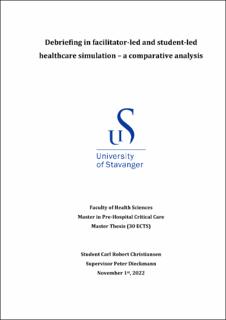| dc.description.abstract | Background. Healthcare simulation is method of training healthcare professionals to gain
knowledge and skill in an experiential way through mock-patient encounters. Costs
associated with simulations are amongst others related to staff due to high teacher-tostudent
ratio. This study aims to investigate whether simulation-experienced paramedic
students can plan, deliver, and debrief simulations. This will be compared to ordinary
simulations as part of a university bachelor’s degree program in Paramedic Science
delivered by regular facilitators. The first research question is if level of reflection in
debriefing is equivalent between facilitator-led and student-led simulation. The second
research question is whether there is equivalent level of participation between the two
modes of simulation.
Theoretical foundation. The study builds on research in healthcare simulation, and peerassisted
learning. It also draws on ideas of reflection, and its implication for professional
competence.
Methods. This is an observational non-inferiority study. Debriefings from facilitator-led
(n=10) and student-led (n=12) simulation where filmed and transcribed. Each turn in a
debriefing conversation was considered a unit of analysis and was counted and rated for its
reflective level. Rating was done using an adapted version of Fleck´s framework of
reflection levels, giving ratings from R0 to R4 as the highest level. Statistical analysis was
done comparing reflective levels between facilitator-led and student-led debriefing using
Chi-Square Test of Independence. The study did not affect student’s workload, learning
opportunities, or assessments. Participation was based on informed consent.
Results. Reflective levels seen in facilitator-led vs student-led debriefings where at R0-
level 32.7% vs 33.8%, R1-level 44.0% vs 44.3%, R2-level 14.7% vs 17.1%, R3-level 0.1%
vs 1.3%, R4-level and 0.1% vs 0.1% respectively. Differences in reflective levels between
facilitator-led and student-led simulations were not statistically significant. Students
participating in the simulation activity contributed to 62.7% of the conversation in
facilitator-led debriefings compared to 60.6% in student-led debriefings, and the difference
was not significant.
Conclusion. This study shows that it is feasible for students to plan, deliver and debrief
their own simulations, with comparable participation and reflection, when comparing to
ordinary simulation. Student-led could be a cost-effective supplement to ordinary
simulation. | |
